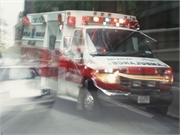'Mobile Stroke Units' Help Rush Treatment to Patients
By Elizabeth HeubeckHealthDay Reporter

THURSDAY, Dec. 5, 2019 (HealthDay News) -- If you're in the throes of a stroke, being stuck in an ambulance in big-city traffic is the last place you want to be -- unless you're riding in a specially equipped ambulance called a mobile stroke unit (MSU).
A new study reports that suspected stroke patients in New York City who were taken to a nearby hospital via MSU began receiving critical, lifesaving treatment about 30 minutes faster than those transported by regular ambulances. Incidentally, the time difference had nothing to do with how fast the ambulances were going.
"Thirty minutes can make the difference between full recovery and permanent paralysis," said study author Dr. Matthew Fink, chairman of neurology at Weill Cornell Medicine in New York City.
That's because a stroke starves the brain of vital oxygen and affected brain cells begin to die within minutes. An ischemic stroke, the most common type, is caused by a clot that interrupts blood flow to the brain.
The study, published Dec. 4 in the Journal of the American Heart Association, examined the time it took for two sets of patients with suspected strokes who called 911 for an ambulance to begin treatment with the blood clot-busting medication alteplase. It should be administered within 3 to 4.5 hours of a patient's first stroke symptoms.
Of 85 patients in the study, 66 went to the hospital in MSUs, emergency vehicles equipped with portable CT scanners that accurately diagnose an ischemic stroke and with alteplase. MSUs are staffed by neurologists trained to diagnose and treat strokes.
Twenty-nine patients diagnosed with ischemic strokes started treatment on the way to the hospital -- about 30 minutes sooner than 19 patients who rode in traditional ambulances. Nine of those non-MSU patients were diagnosed with and treated for ischemic stroke at the hospital.
The authors said their study was the first to examine whether MSUs could treat patients faster in a setting as crowded as New York City, the nation's most densely populated city. The findings were somewhat surprising, one expert said.
"I think a lot of people assumed MSUs would be most valuable in a rural setting, where it's hard for people to get to the hospital," said Dr. Mitchell Elkind, past chairman of the American Stroke Association and president-elect of the American Heart Association.
Elkind was not part of the study but has diagnosed and treated stroke victims on MSUs.
In recent years, mobile stroke units have expanded their reach, primarily in urban areas. Today, they operate in about 10 cities nationwide -- from Trenton, N.J., to Los Angeles.
But high costs are obstacles to getting more in service. One MSU costs about $1 million and costs up to $1 million a year to operate. Plus, there's little data demonstrating superior long-term benefits for patients, experts said.
Study author Fink hopes that will soon change.
He and researchers in several states have a two-year study underway to compare long-term outcomes of stroke patients diagnosed and treated on MSUs to those diagnosed and treated at hospitals.
"I think you're going to see a number of initiatives around pre-hospital care," Fink said. "I think it's a field that's just beginning."
In the meantime, Fink offered this advice about important steps to take while waiting for an ambulance if you think you're having a stroke:
- Lie down flat to improve blood circulation to the brain.
- Stay calm.
- Be prepared to tell emergency personnel what medications you take.
- Avoid taking aspirin, which could aggravate a stroke caused when arterial blood bleeds into the brain.
More information
For tips to prevent stroke and heart disease, visit the American Heart Association.

The news stories provided in Health News and our Health-E News Newsletter are a service of the nationally syndicated HealthDay® news and information company. Stories refer to national trends and breaking health news, and are not necessarily indicative of or always supported by our facility and providers. This information is provided for informational and educational purposes only, and is not intended to be a substitute for medical advice, diagnosis, or treatment.

